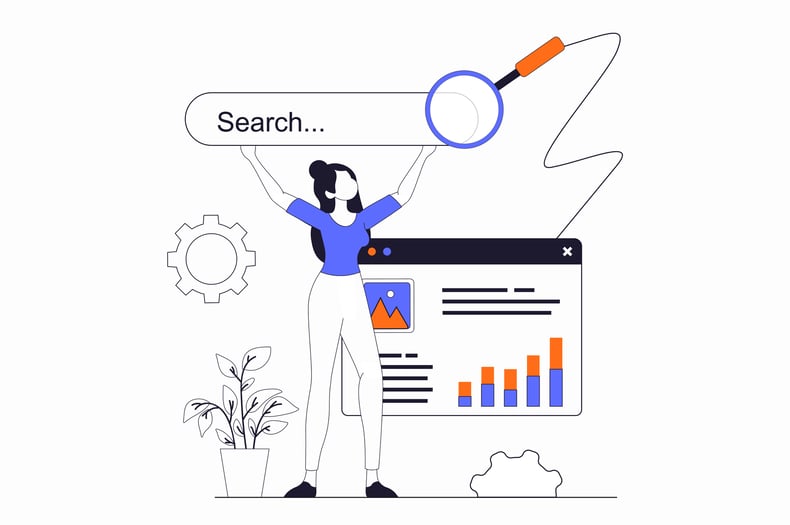
Content Marketing,Content Marketing | 7 min read

Blogs are a valuable tool for content marketing, search engine optimisation, audience engagement, and brand building. They provide an avenue to showcase your expertise, drive traffic, and nurture relationships with your target audience, ultimately supporting the growth and success of your website and business. Blogging has become a crucial part of your marketing strategy for attracting and engaging visitors. It also signals to search engines that your website is active and regularly updated, which can positively impact search rankings.
Blogs present an opportunity to optimise content for specific keywords and topics. By incorporating relevant keywords, meta tags, and internal linking, you can improve your website's visibility in search engine results to give your audience the impression that you are an expert in your niche. If done right, writing blogs can increase the chances of attracting organic traffic by targeting long-tail keywords and addressing specific user queries.
A lot of business owners may doubt the value that a blog could give your brand. Still, truthfully, blogs offer a unique combination of valuable information, personal connection, diverse perspectives, entertainment, and community engagement. These factors contribute to their appeal and popularity among readers, making them a preferred medium for acquiring knowledge, seeking inspiration, and engaging with like-minded individual.
Blogs allow you to showcase your knowledge, expertise, and industry insights. By consistently providing valuable and informative content, you can establish yourself or your brand as a thought leader in your niche. This can help build credibility, trust, and authority, attracting a loyal readership and potential customers.
With the rise of AI Content generators, many say blogging has become saturated with millions of AI-generated content in different niches. Although a saturated space could work to an advantage at some point, looking at small details that matter should also be a big concern regarding expertise, the accuracy of the information and many other factors. Sure, it'd be great to have a barrage of blog impressions on Google, but the question of accuracy and sustainability still remains.

AI itself is not inherently bad for SEO (Search Engine Optimisation). However, there are a few potential pitfalls or negative implications associated with using AI in SEO when it is misused or applied inappropriately. Some unethical SEO practitioners may attempt to use AI to manipulate search engine rankings through spammy or black hat techniques. For example, they might use AI-generated content that is low-quality, keyword-stuffed, or irrelevant, with the sole intention of tricking search engines into higher rankings. Such practices are against search engine guidelines and can lead to penalties or even the deindexing of websites.
AI-powered tools can automate various SEO tasks, such as content creation, keyword research, and link building. While these tools can be helpful, relying solely on AI without human oversight or creativity can lead to a lack of originality and a disconnection from the target audience. SEO should ideally involve human expertise to create valuable, user-focused content that resonates with readers.
Search engines constantly update their algorithms, and AI plays a significant role in those updates. While these algorithm changes aim to improve search results, they can also introduce unpredictability in SEO efforts. AI-driven algorithm updates may cause fluctuations in search rankings, which can impact website visibility and traffic. SEO practitioners need to stay informed, adapt their strategies, and monitor the performance of their websites to navigate these changes effectively. AI relies on vast amounts of data to operate effectively. In the SEO context, this can involve collecting and analysing user data for personalised search results or ad targeting. However, data privacy concerns have become increasingly important in recent years, and the misuse or mishandling of user data can have negative implications for individuals and businesses. SEO practitioners must adhere to data protection regulations and maintain user trust.
The use of AI in content generation is a rapidly evolving field, and striking the right balance between automation and human involvement is a decision that should be based on the specific needs, goals, and ethical considerations of each individual or organisation. There are varying opinions regarding using AI to generate content, and it's important to consider different perspectives.
Here are some factors of how AI-generating platforms may affect your blog’s performance; SEO-wise.
1. Search Engines can’t tell who’s writing the content
From a search engine's perspective, the content's quality, relevance, and usefulness are key factors in determining its ranking. Search algorithms assess various signals, including keyword relevance, website authority, user engagement metrics, backlinks, etc. The goal is to ensure that users find content that answers their questions or satisfies their search intent.
While search engines don't explicitly differentiate between content created by humans or AI, they do consider the overall quality of the content. If AI-generated content meets the criteria of being valuable, informative, and relevant, it has the potential to rank well in search results. Similarly, if human-created content lacks quality or relevance, it may not rank as highly.
However, it's worth noting that search engine algorithms continuously evolve to understand better and evaluate content. They may adapt to consider factors like content authenticity, user feedback, and other signals in the future. The aim is to continually improve the search experience and ensure the most useful and trustworthy content is presented to users.
Regardless of whether a human or AI creates the content, the focus should be on providing high-quality and valuable information that meets the needs of the target audience.
2. Writing like an expert w/o having to be an expert
AI-powered language models like ChatGPT have the capability to generate text that mimics the writing style and knowledge of experts. These models are trained on vast amounts of data from diverse sources, including books, articles, websites, and more. As a result, they can generate content that appears to be written by someone with expertise in a particular subject. Not all the time- this is why at some point, AI does a fair bit of “cheating” the system to come up with content written by a non-expert and sounding like someone with intermediate knowledge over a subject.
AI can assist individuals who may not have deep expertise in a specific field by providing them with relevant information and suggestions. It can help formulate coherent and well-structured content by offering insights, generating ideas, and even proofreading for grammar and style. However, it's important to note that while AI models can produce content that appears expert-like, they do not possess true understanding or domain-specific knowledge. They rely on patterns in the training data and may occasionally generate inaccurate or misleading information.
It is crucial to exercise caution when relying solely on AI-generated content for complex or specialised subjects. Independent fact-checking, critical thinking, and verification from credible sources remain essential to ensure the accuracy and reliability of the information. AI-generated content can be a valuable tool for assisting individuals in their writing process, but it should be used as a complement to human expertise rather than a replacement. Combining AI assistance and human oversight can lead to improved content quality and better outcomes.

3. Some potential pitfalls
AI models generate content based on patterns and examples in their training data. While they can produce coherent and relevant text, they may struggle with creativity and originality. AI-generated content may lack the unique perspectives, insights, and creative approaches humans can bring to content creation.
AI’s Inability to understand context and nuances means that AI generated-content often lacks contextual understanding and may not grasp the subtleties, cultural references, or implied meanings in a given text. This can lead to inaccuracies or misinterpretations in the generated content, especially for complex or specialised subjects.AI models learn from the data they are trained on, which can introduce biases in the training data. If the data contains misinformation or biased content, the AI model may inadvertently generate or reinforce such biases in its output. Careful data selection and bias mitigation techniques are necessary to minimise this risk.
AI-generated content may require extensive editing and quality control to ensure accuracy, readability, and adherence to specific guidelines. Without human oversight, there is a risk of errors, inconsistencies, and inappropriate or irrelevant content being published. Using AI to generate content raises ethical questions, such as disclosure and transparency. It's important to indicate when content has been AI-generated to maintain trust with readers. Additionally, issues surrounding copyright and intellectual property can arise when using AI-generated content.
Relying heavily on AI for content writing may reduce the emphasis on developing human writing skills. Over-reliance on AI models may hinder the development of critical thinking, research abilities, and other essential skills that humans bring to the content creation process.
It's important to approach AI-generated content cautiously, acknowledging its limitations and being mindful of the potential risks and challenges. Combining AI tools with human expertise and oversight can mitigate these disadvantages and create more balanced and high-quality content.
4. Do Search Engines have more stringent gates now with the presence of AI platforms?
Search engines have continually refined their algorithms to deliver the most relevant and useful search results to their users. The emergence of AI technologies, including AI language models like ChatGPT, can influence how search engines approach algorithm development. Here are a few ways search engines may become more stringent with their algorithms:
Content quality and relevance: Search engines may place an increased emphasis on content quality, relevance, and user satisfaction. AI language models have the ability to evaluate and understand the quality of content more effectively. Search engines may leverage AI models to assess readability, comprehensiveness, and accuracy when determining search rankings.
User intent and semantic search: AI models excel at understanding natural language and context. Search engines may increasingly prioritise understanding user intent and providing results that best match that intent. Semantic search, which focuses on the meaning and context behind search queries rather than just keywords, may be further enhanced by AI technologies.
Trustworthiness and credibility: Search engines strive to provide reliable and trustworthy information to users. With AI-generated content in the mix, search engines may pay closer attention to the credibility and accuracy of the sources and signals used to rank content. Fact-checking mechanisms and user feedback could be utilised to ensure the veracity of information.
Spam detection and manipulation prevention: AI algorithms can assist in identifying and penalising spammy or manipulative tactics employed by websites to boost their search rankings artificially. Search engines may develop more sophisticated algorithms to detect AI-generated spam or low-quality content, ensuring that genuine, valuable content ranks higher.
Personalisation and user satisfaction: AI models enable personalisation based on individual user preferences and behaviour. Search engines may use AI-driven algorithms to tailor search results to specific users, considering their past search history, demographics, and preferences. The aim is to enhance user satisfaction and deliver more personalised search experiences.
It's important to note that search engine algorithms are complex, and their development involves many factors. While AI can influence algorithmic advancements, search engines will continue to evolve based on a holistic view of user needs, quality standards, and other considerations.
Given all these, if AI is used irresponsibly by people, SEO and other algorithms may be at risk of a huge reinvention because of the possible loss of quality content over the AI generation platform.
If you need marketing advice or tips on ensuring you don’t misuse AI or Chat GPT, reach out to Ucidity so we can talk and get you some expert marketing advice!
Published on May 08, 2023

%20-%20Elevate%20Your%20Blog%20Results.jpg)
%20-%20Unlocking%20Success.jpg)
.jpg)
